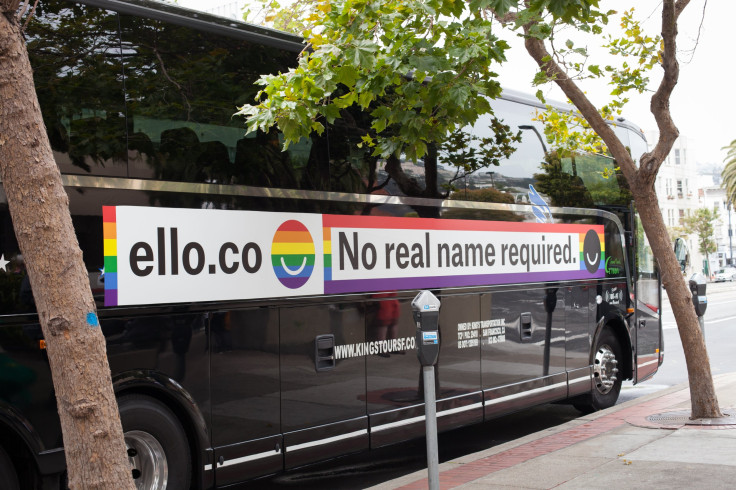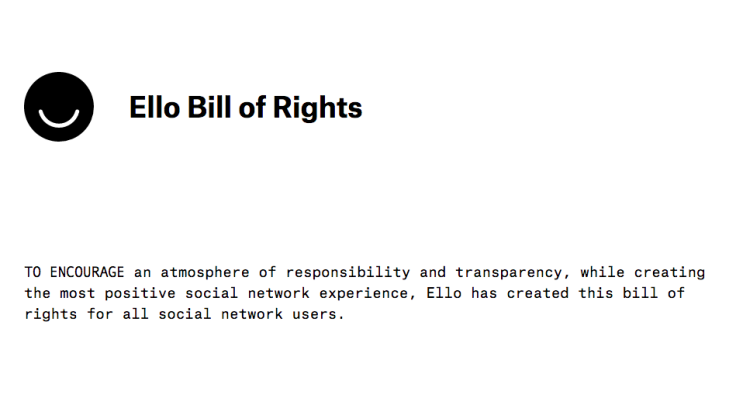Ello Issues 'Bill Of Rights' For Social Network Privacy And Transparency; Calls Out Google, Facebook

Social media networks have thrived by incorporating advertisements along with collecting and selling user data. But the social network Ello, along with several European privacy watchdogs, have called out these companies for deceptiveness and manipulation. On Wednesday, Ello published a Bill of Rights to describe what policies it believes should be guaranteed on any social network.
Ello's Bill of Rights outlines 10 "fundamental rights" that not only will serve as guiding principles for Ello but, Chief Executive Officer Paul Budnitz said, should extend to other companies. "We believe these are the basic rights of every social media user in the world, on every social network," Budnitz said.
Several of the principles address concerns that privacy advocates and regulators have brought up -- and even pursued in court -- with other social media companies. These rights would give users the ability to turn off data tracking (currently the subject of a court case brought by a Belgian watchdog against Facebook), allow users to retain full control and ownership of posted content (an issue that has motivated the launch of several pay-for-content networks), the option to use a pseudonym and limit what personal information is required (Germany sued Facebook over this in 2012) and access to terms and conditions written in simple language (a step Snapchat took after settling a privacy lawsuit with the Federal Trade Commission).

The last principle guarantees the "right to permanently delete your account." Frustrated by the steps it takes to delete a Facebook account and the fact that the data can still be recovered, Budnitz and his team made the process simple. Just click one button called "Delete."
Anyone, with or without an Ello account, can sign the Bill of Rights by going to the microsite on Ello. Sign-up requires just a name and email address. After pressing “Sign It,” participants will receive an email to verify their identify and can then accept to have the signature added to the website. Ello included a clarification that email addresses “will not be shared or sold to anyone.” Participants can also choose to list a website of their choosing that will be a hyperlink on their name. Examples from those who have already signed the bill include Ello profile pages, personal websites and Bandcamp accounts.
The bill’s release was timed with the upcoming Fourth of July celebrations in the United States. But Ello’s users extend to far more than just Americans. About half of Ello's "many millions" of members are overseas, with large groups coming from Germany, Brazil, Portugal and the United Kingdom, Budnitz said. International Business Times was not immediately able to independently verify the size of Ello's user base.
Ello is not yet profitable but is pulling in revenue from t-shirt sales and other products. The company has plans to start more e-commerce ventures, such introducing a "buy" button as many other networks -- including Pinterest and Google -- have recently done. The company is also supported by $11 million in venture capital funding, raised in the last year.
Ello's privacy push comes amid growing scrutiny of Facebook and Google. "If you step back for a second and you look back, really a lot of what’s happening now is a little bit like George Orwell’s '1984,'" Budnitz said. "You have several European governments calling out these practices and people referring to this as the greatest threat to civil liberties."
While the drag queen and LGBT community, to which Ello has donated money, has come out against Facebook's real-name policy in public protests and marches, it was a German privacy watchdog that first challenged Facebook's policy in 2012. Last month, Belgian regulators accused Facebook of mishandling personal data and illegally tracking online activity.

When Ello launched as a private site in July 2014, it arrived with a manifesto that began with, "Your social network is owned by advertisers" and ended with, "You are not a product."
"Ello is a business, by the way. So what creates a good business and a good environment goes hand in hand. We thought, ‘Why don’t we take the manifesto a step further?’" Budnitz said. The document began with seven principles and expanded to 10 over time. "It feels pretty complete," said Budnitz when asked about amendments to the "bill." But if changes were to be made, they would require feedback and a re-signing.
As part of its marketing strategy, Ello is currently running an anti-ad campaign on Facebook and plans to extend the effort to other social networks. The network has made hundreds of ads that are specifically catered to certain groups, which can be as broad as "photographers" or as narrow as "parents who live in Iowa and have earned a bachelor's degree." Through Facebook's targeting power, Ello can limit the ads to specific audiences.
These efforts are supported by the company’s venture capitalist funding, which includes investments from Foundry Group and TechStars. The marketing budget is in the six figures, Budnitz said.
© Copyright IBTimes 2025. All rights reserved.




















